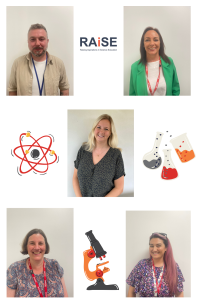
The final cohort of authorities to engage in the RAiSE investment has embarked upon the programme.
Each of the five regions has appointed Primary Science Development Officers (PSDOs) to lead upon developing and delivering local action plans linked to local need and context, as well as national drivers.
A total of 27 of Scotland’s 32 local authorities engaged in the national programme which has created 70,529 hours of professional learning through 2,716 opportunities over the course of the past five years.
The current PSDOs will be in post for 23 months, tasked with laying the foundations for a sustainable approach to primary STEM learning in their respective areas.
Laura McCafferty, National Education Officer for RAiSE, said:
“We are delighted to further expand this network, drawing upon the experiences and sustainability created by legacy cohorts.
“Our data shows us that RAiSE is greatly improving teachers’ confidence and skills, as well as pupils’ aspirations and enjoyment in relation to STEM. It is driven by national priorities but very deliberately delivered through a local lens to ensure activities are impactful.
“This is a great group of PSDOs who I am very much looking forward to working alongside over the next two years.”
Ali MacLachlan, UK Director at The Wood Foundation, said:
“We are incredibly proud of the achievements of RAiSE to date and look forward to further strides being taken over the next two years so that our children are being given opportunities from the earliest stages to learn and love STEM in a way that sets them up for future success.”
RAiSE (Raising Aspirations in Science Education) is a programme of Education Scotland, The Wood Foundation, Scottish Government, and participating local authorities which empowers primary practitioners with the skills, confidence, and networks to develop and deliver motivating and engaging primary STEM experiences.
Michaela Dickson, East Dunbartonshire, @STEMEastDun
How do you think teachers will benefit from your post?
“Becoming PSDO has enabled me to make fantastic connections with other passionate practitioners across the country who are keen to share and develop ideas, resources, and best practices.
“I am now in a position where I can promote all things STEM across my local authority. This will support practitioners to stay up to date with developments, enhance their STEM teaching methods, build confidence in integrating STEM into daily practice as well as create more effective and engaging learning environments for learners.
“I am excited to offer tailored professional learning opportunities to address unique challenges and needs for schools to empower teachers to further develop their abilities and, again, continue to build confidence in delivering high-quality STEM learning experiences.
“I will foster a supportive network for practitioners to share their ideas, experiences, success stories and questions to ultimately build a collaborative and inclusive STEM community. Those connections are all because of this very exciting role and I look forward to equipping teachers with the necessary tools and knowledge to drive STEM in East Dunbartonshire; supporting the next generation of innovative thinkers and problem solvers!”
Alison Heaton, Scottish Borders, @STEMScotBorders
Why is STEM important in your authority?
“STEM is important in the Scottish Borders because it prepares our young people for the rapidly changing world. It promotes critical thinking, problem solving and innovation which are essential for tackling real world challenges. STEM education also prepares students for future careers in fields which are driven by technological advances. By engaging students in hands-on experiments and projects we will also nurture curiosity and creativity. Overall, STEM cultivates a foundation for lifelong learning and enables individuals to contribute to society in a meaningful way.”
Gill Neeson, Inverclyde
What do you hope to achieve in your role?
“I hope to enthuse and support practitioners in providing their pupils with high quality, exciting, engaging, and fun learning opportunities in science and STEM. I also hope to create a consistent approach to the delivery of STEM by working with practitioners to raise the STEM profile by developing an Inverclyde Progression Pathways in Science, providing professional learning, and supporting schools in their stem journey.”
Paul Malcolm, Argyll & Bute, @argyllbuteSTEM
Why do primary pupils love STEM?
“Initially the excitement and engagement created from getting hands on with various resources, tools, and experiments. More importantly though the opportunity to develop leadership and ownership of their learning including the chance to create their own enquiries and solutions to problems using critical thinking and collaboration with their peers. In addition, links to the real world, career pathways and globally relevant themes are also stimulating and engaging for pupils allowing them to consider the possibilities open to them and develop an understanding of the wider world.”
Rachel Smith, East Ayrshire
What are you excited about in your role?
“I am excited about taking STEM to the next level in East Ayrshire Council. In my primary teacher role I have always felt really passionate about STEM. I want to instil some of that passion into as many schools as possible. I’m excited to see what adventures other schools and local authorities have been on with regards to STEM and gain great initiatives and ideas along the way. I’m looking forward to meeting new people and networking across local authorities but most of all I’m excited about the impact this role will have on our learners.”

